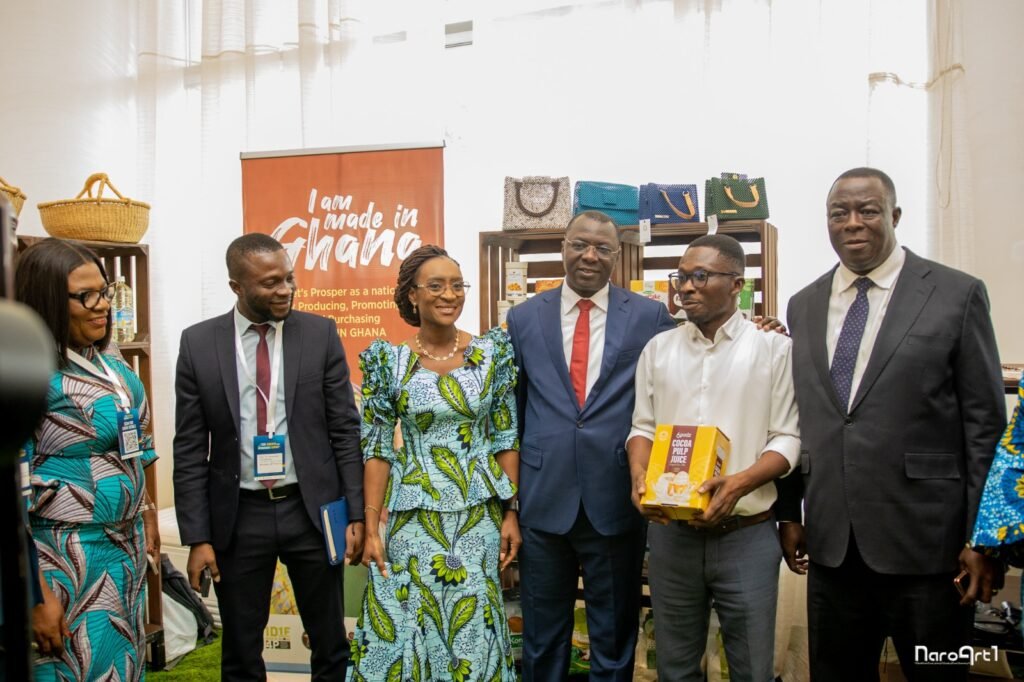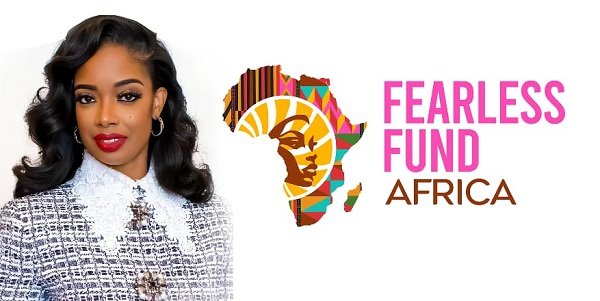Business
A golden moment for Ghanaian SMEs Deputy GEXIM CEO

The Government of Ghana through the Ministry of Finance on Tuesday July. 16, 2024, launched a ground breaking initiative which sought to assist Ghanaian Small and Medium-sized Enterprises to scale up and build their capacity to make them sustainable and compete favourably in the international marketplace.
It is dubbed the Small and Medium-sized Enterprise (SME) Growth & Opportunity Programme or SME GO Programme.
The event was launched by the President of the Republic of Ghana, His Excellency Nana Addo Dankwa Akufo-Addo at the Kempinski Hotel Gold Coast City Accra and attended by all key and relevant stakeholders in the SME, Banking and Finance sectors.
On the sidelines of the event, the Deputy Chief Executive Officer of the Ghana Export – Import Bank, Ms. Rosemary Beryl Archer described the SME GO Programme, as a “Golden Moment” for Ghanaian SMEs and affiliated sectors.
Available data by the Ministry of Finance indicate that Ghanaian SMEs account for 92 percent of existing companies, 85 percent of manufacturing jobs and 70 percent of Gross Domestic Product (GDP).
Knowing its strategic importance to economic development, the Government is focused on developing a sustainable financing framework that allows for both public and private sectors to scale up financial and technical support towards Ghanaian SMEs.
In recent times, the world has experienced challenges and businesses were not spared. Unfortunately, SMEs are the hardest hit, with Ghanaian SMEs not an exception.
Government is determined to address these challenges, particularly access to financing, which have become inimical to advancing broad-based SME development.
Through the SME GO Programme, the Ministry of Finance aims to support the delivery of a robust SME financing programme that brings Ghana closer to its growth potential of approximately 5%.
The SME GO Programme offers targeted financial and technical support to high-growth potential SMEs to accelerate their growth by various interventions through short and medium term support through, including technical training and handholding support for beneficiaries, and optimizing public policies.
The financial support package, with flexible financing options, is to enable businesses to obtain the necessary resources to scale their operations effectively.
Three state agencies have been selected as strategic partners for the implementation of the programme which is to help the Government to create a lasting initiative and also develop a permanent infrastructure to support SMEs and ensure a sustainable impact on the ecosystem. They are the Ghana Export – Import Bank (GEXIM), Ghana Enterprises Agency (GEA) and the Development Bank of Ghana (DBG).
The Ghana Enterprises Agency is to work closely with SMEs to assess their financing and capacity building requirements and provide targeted support. Leveraging its expertise and network, the Ghana Export – Import Bank will facilitate access to financial and technical services to meet the diverse needs of export ready SMEs.
The Development Bank of Ghana is collaborating with the International Finance Corporation of the World Bank to work with participating financial institutions (PFIs) to launch a SME catalytic fund that will deliver larger multiples of finance required for SMEs to continue to scale their operations.
Technical assistance in the form of training and support is a key part of the SME GO Programme with the Ghana Export – Import Bank championing a collaboration with other agencies and stakeholders to set up an ultramodern Food Processing Pilot Plant in Accra, Ghana.
This will help enterprises with manufacturing solutions by testing their production and scaling up ideas in a standardized food processing pilot plant.
The financial and technical support to be provided to SMEs through the dedicated funds created by each institution under the SME GO Programme is the first step towards strengthening the SME ecosystem with the introduction of transformative measures.
In addition, regulatory and operational initiatives are being prepared to be enacted later when the immediate support required has been provided. The envisaged measures range from the creation of a one-stop-shop for SMEs to the design of business enclaves providing SMEs with fiscal incentives, financial resources and shared technology.
Ms. Archer concluded that it was her wish for Ghanaian SMEs across various sectors to prioritise value addition. A systematic approach to value chain development will result in the elimination of underlying causes of market underperformance, which is definitely going to be a game-changer.
“We now need to take a look at how our businesses can bring a product from the initial idea to its final market.Why should we strengthen the value chain across sectors? This definitely holds the key to increasing profits and productivity for SMEs, and making them sustainable by withstanding disruptions at all times. Ultimately, this will also lead to an increased contribution to socio-economic development of Ghanaian SMEs,” he added.
Business
Fearless Fund launches Ghana Microfinance Fund …offers GH¢100,000 pitch prize

As part of the launch of its newly announced Microfinance Fund in Ghana, Fearless Fund is hosting a pitch competition for women entrepreneurs operating in the fast-moving consumer goods (FMCG) sector. This will offer one standout founder the opportunity to secure GH¢100,000 in growth capital.
The pitch competition forms part of Fearless Fund’s broader expansion into Africa. It reflects the firm’s commitment to creating practical, accessible pathways for women entrepreneurs to scale their businesses and build long-term wealth.
The competition is targeted at women-led FMCG businesses, including those involved in trading, production, packaging, distribution, and retail sectors that play a critical role in everyday commerce yet remain significantly underfunded despite their economic importance.
“Women across Africa are building resilient, high-impact businesses, yet they continue to receive only a fraction of the capital needed to grow,” HM Queen Wa Arian Simone, CEO and Founding Partner of Fearless Fund, said in a statement issued in Accra yesterday.
“This pitch competition is about visibility, access, and possibility, ensuring women entrepreneurs have the opportunity to compete, scale, and lead,” she added.
In addition to the competition, the statement said the Fearless Microfinance Fund would provide microfinance loans ranging from GH¢10,000 to GH¢30,000 to women entrepreneurs in Ghana, offering catalytic capital to support business expansion, inventory growth, improved distribution, and market access.
“Alongside its focus on supporting women entrepreneurs, the Fearless Microfinance Fund also presents an opportunity for social-impact-focused investors to participate in inclusive economic growth. Investors can secure a guaranteed 10 per cent annual rate of return through the fund, aligning financial performance with measurable social impact,” the statement added.
According to Fearless Fund, the pitch competition represents more than a single funding opportunity; it is part of a broader strategy to spotlight women entrepreneurs who are ready to scale and to support the next generation of African wealth creators.
The pitch competition will take place as part of the official launch activities for the Fearless Microfinance Fund in Ghana. Women entrepreneurs who are ready to scale are encouraged to apply and participate. Interested participants can explore access to the Fearless Microfinance Fund by visiting the company’s website.
HOW TO APPLY
Women entrepreneurs who are ready to scale are encouraged to apply for the pitch competition and explore access to the Fearless Microfinance Fund by visiting https://www.fearless.fund/africa
For more information on Fearless Fund, the Fearless Microfinance Fund in Ghana, and ongoing updates, visit https://www.fearless.fund/africa or follow Fearless Fund on Instagram, Facebook, and LinkedIn
BY TIMES REPORTER
Follow Ghanaian Times WhatsApp Channel today. https://whatsapp.com/channel/0029VbAjG7g3gvWajUAEX12Q
Trusted News. Real Stories. Anytime, Anywhere.
Join our WhatsApp Channel now! https://whatsapp.com/channel/0029VbAjG7g3gvWajUAEX12Q
Business
Fearless Fund expands to Africa…launches Microfinance Fund in Ghana

fearless fund, the world’s first venture capital firm built by women of colour for women of colour, and a global leader in economic inclusion, has announced its official expansion into africa with the launch of the Fearless Microfinance Fund in ghana.
this launch marks a significant step in advancing Fearless Fund’s mission to close the global wealth gap by improving access to capital for under-resourced women entrepreneurs.
the fund is structured to bridge this gap through microfinance loans ranging from GH¢10,000 to GH¢30,000, targeted at underserved women-owned businesses, while systematically measuring social impact across job creation, geographic reach, digital inclusion, and support for first-time borrowers.
“expanding our mission to africa has always been central to closing the global wealth gap,” her majesty queen wa arian simone, chief executive officer and founding partner of Fearless Fund said in a statement issued by the company in accra on friday. “africa represents the world’s most dynamic economic frontier. our presence in ghana is about ensuring women entrepreneurs across the country have access to the capital they need to build, scale, and sustain successful businesses. fearless fund is a beacon of what’s possible when women of colour lead with vision and power,” she said.
ghana represents a critical entry point for Fearless Fund’s african expansion. while the country ranks first globally with 46.4 per cent of businesses owned by women, women-led enterprises continue to earn an average of 34 per cent less profit than male-owned firms due to persistent financial, social, and structural barriers.
globally, Fearless Fund has delivered measurable impact, having raised multiple eight-figure venture capital funds with average cheque sizes ranging from $500,000 to $2 million, secured a historic $240 million debt facility to expand access to capital for under-resourced entrepreneurs, and awarded more than $5 million in non-dilutive grants to women of colour founders/entrepreneurs across the united states and globally.
its get venture ready (GVR) programme has equipped over 1,000 women with investor-readiness training, mentorship, and tools to scale sustainable businesses.
fearless fund is backed by leading global institutions, including bank of america, jpmorgan chase, paypal, costco, and mastercard, and its work has been recognised by major international media outlets such as CNN, Bloomberg, the wall street journal, and Forbes.
“beyond the united states, Fearless Fund has established a growing global footprint, deploying millions of dollars into startups across africa, australia, and canada, awarding grants through ecosystem partners in countries including côte d’ivoire, ghana, and botswana, and educating over 200,000 entrepreneurs through its partnership with Trace Academia Africa,” the statement said.
the launch of the Fearless Microfinance Fund will be supported by a series of engagement and activation initiatives to empower women entrepreneurs and strengthen ghana’s entrepreneurial ecosystem.
“to be the first to receive updates on the Fearless Microfinance Fund in ghana, upcoming initiatives, and opportunities for women entrepreneurs, follow Fearless Fund on instagram, facebook, and linkedin,” the statement said.
By Times Reporter












